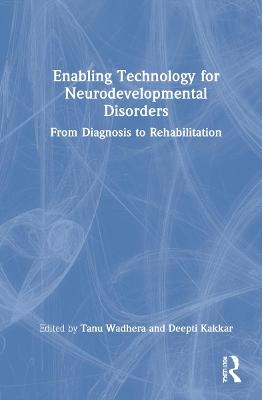
Enabling Technology for Neurodevelopmental Disorders
Routledge (Verlag)
978-0-367-76116-5 (ISBN)
Tanu Wadhera is Assistant Professor at Department of Electrical and Instrumentation Engineering, Thapar Institute of Engineering and Technology, Patiala, Punjab, India. She earned her Ph.D. degree in Electronics and Communication Engineering and has a total of six years of research experience, with four years at National Institute of Technology, Jalandhar, Punjab, India. Her research interests include Artificial Intelligence, Assistive Technology, Behavioural Modelling, Biomedical Signal Processing, Cognitive Neuroscience and Machine Learning. Deepti Kakkar is Assistant Professor at Department of Electronics and Communication, National Institute of Technology, Jalandhar, Punjab, India. She has a total academic experience of 15 years and has guided more than 40 postgraduate engineering dissertations and over 30 papers international Journals and Conferences. Her recent research interests include Cognitive Neuroscience and Neurodevelopmental disorders.
1. Assistive Technology and Neurodevelopmental Disorders: Indian Perspective 2. The Use of Educational Technology to Improve Learning for Persons with Neuro-developmental Disorders 3. Technological Advances for the Diagnosis and Rehabilitation of Dyslexia 4. Impact of Technology on Lives of Children with Autism Spectrum Disorder 5. Telehealth for Children with Autistic Spectrum Disorder: Indian Need Versus Challenges 6. Advances in Innovative Technologies for Neuro-developmental Disorders: Current and future concerns 7. Assistive Technology for Promoting Inclusive Education of Children with Neurodevelopmental Disorders 8. Technology Driven Interventions for Attention Deficit Hyperactivity Disorder (ADHD) 9. Technology Enabled Precision Medicine in Neurodevelopmental Disorders: Artificial Intelligence and Multidimensional Datasets 10. Computational Psychiatry to Bridge the Gap between Data- Driven and Theory Driven Approaches: A Review 11. Alzheimer’s Disease Diagnosis using Functional and Structural Neuroimaging Modalities 12. AviR- Autism Rehabilitation with webVR using Text Classification 13. Future Visions for Deep-Learning-based Approaches for NDDs: Learning from Supervised Brain Tumor Segmentation 14. Deep Brain Stimulation & Spectral EEG features for Prognosis of Parkinson’s Disease 15. A Hybrid Deep Model with Concatenating Framework of Convolutional Neural Networks for Identification of Autism Spectrum Disorder (ASD)
.
| Erscheinungsdatum | 19.04.2022 |
|---|---|
| Zusatzinfo | 18 Tables, black and white; 35 Line drawings, black and white; 13 Halftones, black and white; 48 Illustrations, black and white |
| Verlagsort | London |
| Sprache | englisch |
| Maße | 156 x 234 mm |
| Gewicht | 453 g |
| Themenwelt | Sachbuch/Ratgeber ► Gesundheit / Leben / Psychologie |
| Geisteswissenschaften ► Psychologie ► Entwicklungspsychologie | |
| Medizin / Pharmazie ► Medizinische Fachgebiete ► Psychiatrie / Psychotherapie | |
| ISBN-10 | 0-367-76116-5 / 0367761165 |
| ISBN-13 | 978-0-367-76116-5 / 9780367761165 |
| Zustand | Neuware |
| Informationen gemäß Produktsicherheitsverordnung (GPSR) | |
| Haben Sie eine Frage zum Produkt? |
aus dem Bereich


